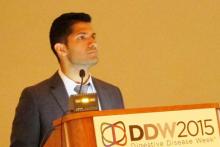WASHINGTON – Patients with inflammatory bowel disease had a one-third higher risk for having a recurrent Clostridium difficile infection than did the general population, and a 20-fold higher risk for needing a total colectomy because of the infection, a study showed.
Risk factors for recurrent C. difficile infection (rCDI) in patients with inflammatory bowel disease (IBD) include a recent hospitalization, immunosuppressive drugs, and antibiotics, but which drugs are most culpable is unclear, according to Dr. Roshan Razik of Mount Sinai Hospital, Toronto, and the University of Toronto.
“The drugs that we’re using do place patients at higher risk for recurrent C. difficile, but it’s yet to come out which drugs within drug categories – immunomodulators, antibiotics, biologics – pose a higher risk, although we are beginning to see evidence, for example, that azathioprine is higher risk than methotrexate, infliximab might be higher risk than adalimumab, so we have to continue to parse through the data,” he said in an interview.
He and his colleagues conducted two retrospective studies to assess the effects of rCDI on patients with IBD.
The first study used a case-control design, including patients with IBD who had two or more documented instances of rCDI from 2010 through 2013 as cases, and IBD patients with only one infection as controls.
The second study used a retrospective cohort to calculate the incidence of rCDI in patients with IBD, compared with patients without IBD, Dr. Razik reported at the annual Digestive Disease Week.
There were a total of 503 patients who tested positive for CDI included in the studies: 110 patients with IBD (49% with Crohn’s disease and 51% with ulcerative colitis) and 393 without. The mean age was 58.8 years, and 61.4% were female.
Compared with patients without IBD, patients with Crohn’s disease or ulcerative colitis developed CDI at a younger age (39 years vs. 64 years, P < .001), used more steroids (39.1% vs. 12%, P < .001), used more immunosuppressive agents (42.7% vs. 13.2%, P < .001), and were more likely to have a prior bowel resection (28.2% vs. 11.5%, P < .001).
In all, 32% of patients with IBD had a recurrent CDI, compared with 24% of non-IBD patients (P < .01). There were no significant differences between the groups in the number of hospitalizations due to CDI, but patients with IBD were significantly more likely to require colectomy because of the infections (6.4% vs. 0.3%, P < .001).
In a multivariate analysis, risk factors for rCDI in patients with IBD included nonileal Crohn’s disease (odds ratio, 2.59; P < .001), recent antibiotic therapy (OR, 2.60; P < .001), use of a 5-aminosalicylic acid drug (OR, 3.06; P < .001), steroid use (OR, 2.94; P < .001), biologic therapy (OR, 2.50; P = .001), a recent hospitalization (OR, 2.62; P < .001), and no previous bowel resections (OR, 1.72; P = .020).
Clinicians need to look beyond the usual suspects, antibiotics, as causative agents for rCDI. Immunomodulators and biologic agents also were strongly associated with rCDI in the study, Dr. Razik noted.
The study source was not disclosed. He reported having no relevant financial conflicts of interest.


